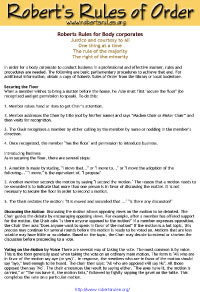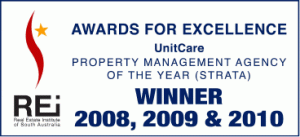Meetings: Preparation, Opening & Chairing
Tools
The following may be of assistance.
|
Meeting Minutes Pro forma |
Three Laws of Meetings |
Meeting Manage Video |
|
Meeting Hints Sheet |
Meeting Procedure Rules |
Link to next step – Previous Years Minutes
Satellite images of your group
A satellite image of your group can be very useful at your meetings.
The image below was copied from Google Earth. It shows a group of units in Adelaide. At a meeting owners can use this image to address grounds and building related matters, such as problem trees, poorly kept yards, roof and driveway issues. A picture is worth a 1000 words.
Click on this image as access the Google Earth download site.
Community Titles Act
Section 83—Procedure at meetings
(1) The presiding officer of a corporation will preside at general meetings of the corporation.
(2) The developer (or one of the developers if there are two or more), or the person appointed by the developer to attend and vote on the developer’s behalf, will preside at the first meeting of the corporation until the presiding officer has been appointed.
(3) In the absence of the presiding officer, a person present may be appointed to preside at the meeting by the persons present and entitled to vote at the meeting.
(4) The quorum for the transaction of business at a general meeting is determined by dividing the number of persons entitled to attend and vote at the meeting by two, disregarding any fraction and adding one.
(5) If a quorum is not present within half an hour of the time appointed for a general meeting:
(a) the members present must appoint:
(i) another day for the meeting being at least seven days but not more than 14 days later; and
(ii) the time and place for the meeting; and(b) the meeting stands adjourned to that day at that time and place; and
(c) if a quorum is not formed at the adjourned meeting within half an hour, the persons present who are entitled to vote constitute a quorum.(6) Where a meeting of a corporation is adjourned under subsection (5), the secretary of the corporation must cause reasonable notice of the day, time and place of the adjourned meeting to be given in writing to the members of the corporation.
(7) Except where otherwise provided by this Act or by the by-laws of a community corporation, the decisions of the corporation in general meeting will be made by ordinary resolutions.
(8) A corporation must cause accurate minutes to be kept of proceedings at its meetings.
(9) Subject to this Act and the by-laws, a corporation may determine procedures at its meetings.
Community Titles Act
Section 84—Voting at general meetings
(1) Subject to this section the owner of a community lot is entitled to attend and vote at general meetings of the corporation.
(2) The owner of a development alot is not entitled to attend or to vote at general meetings in his or her capacity as the owner of that lot.
(3) Subject to subsection (8), an owner (whether a secondary or tertiary corporation or any other body corporate or a natural person) may nominate another person to attend and vote at meetings on his or her behalf.
(4) Subject to subsection (8), where there is more than one owner of a lot, a person (who may, but need not, be one of the owners) may be nominated by all of the owners to
vote on their behalf.(5) A nomination referred to in subsection (3) must be made by written notice to the secretary of the corporation and may be revoked at any time by the owner by subsequent written notice to the secretary.
(6) A nomination referred to in subsection (4):
(a) must be made by written notice to the secretary of the corporation by all of the owners of the lot;
(b) must specify the meeting or meetings to which it relates;
(c) may be revoked at any time by one of the owners by written notice to the secretary.(7) Where there is more than one owner of a lot and there is no person who is entitled to vote on behalf of the owners pursuant to a nomination under subsection (4), the following provisions apply:
(a) if only one of the owners attends a meeting—the vote is exercisable by that person;
(b) if two or more of the owners attend a meeting—the vote is exercisable by one of them in accordance with an agreement between all the owners attending the meeting but, if there is no such agreement, none of them is entitled to vote.(8) Subject to subsection (9), the developer or an associate of the developer cannot be nominated under subsection (3) or (4) if one or more of the community lots is used, or is intended to be used, solely or predominantly for residential purposes.
(9) Subsection (8) does not apply if the community parcel is subject to a leaseback arrangement.
(10) A person who is not an owner of a community lot but has been nominated by an owner or owners to attend and vote at a general meeting of the corporation, must be regarded as a member of the corporation for the purposes of proceedings at the meeting.
(11) The owner of a lot may exercise an absentee vote on a proposed resolution by giving the secretary written notice of the proposed vote at least six hours before the time of the meeting.
(12) A member attending a meeting of a corporation may demand a written ballot on any question.
(13) The ballot will be taken in such manner as the person presiding at the meeting thinks fit.
(14) A vote cannot be exercised in relation to a lot unless all amounts payable to the corporation in respect of the lot have been paid.
(15) If the number of votes supporting a resolution is equal to the number of votes against the resolution, the resolution is lost.
Section 87—Value of votes cast at general meeting
(1) The number of votes that may be cast in respect of each community lot on any matter
arising for decision at a general meeting of a community corporation is:(a) if one or more of the lots is used, or is intended to be used, solely or predominantly for residential purposes—one;
(b) in any other case—(i) the number prescribed for that purpose by the by-laws; or
(ii) if the by-laws do not prescribe a number—one.(2) A unanimous resolution is required to vary the number of votes prescribed by the by laws that may be cast in respect of each community lot.
(3) If the developer owns one or more, but not all, of the community lots in a community parcel he or she is entitled to the aggregate of the votes determined in accordance with subsection (1) in respect of those lots or to a number of votes equivalent to the aggregate of the votes determined in accordance with that subsection that may be exercised by all the other members of the corporation, whichever is the lesser.1
Note:
1 The effect of this provision is that the voting power of the developer can never be greater than the combined voting power of the other members of the corporation.
Community Titles Act
85—Nominee’s duty to disclose interest
(1) A person (whether a co-owner of a lot or not) who has been nominated to attend and vote at meetings of a community corporation on behalf of another person and who has a direct or indirect pecuniary interest in any matter to be voted on at a meeting must:
(a) if it is practicable to do so, disclose the nature of the interest to his or her pincipal before the vote is taken; or
(b) in any other case, disclose the nature of the interest to his or her principal as soon as practicable after the vote is taken. Maximum penalty: $15 000.
(2) A co-owner of a lot is not obliged by subsection (1) to disclose an interest that he or she has in common with his or her other co-owners.
(3) It is a defence to a charge of an offence against subsection (1) to prove that the defendant was not, at the time of the alleged offence, aware of his or her interest in the matter.
Community Titles Act
86—Voting by a community corporation as a member of another community corporation
(1) A secondary corporation that is a member of a primary corporation or a tertiary corporation that is a member of a secondary corporation may vote at a meeting of the primary or secondary corporation if it has been authorised to do so by resolution of its members.
(2) When determining whether a resolution of a community corporation is a unanimous resolution, the vote of a secondary or tertiary corporation (that is a member of the corporation) that is cast in favour of the resolution:
(a) will be counted in favour of the resolution if it was authorised by a unanimous resolution of the secondary or tertiary corporation;
(b) will be taken to be cast against the resolution if it was not authorised by a unanimous resolution of the secondary or tertiary corporation.
(3) When determining whether a resolution of a community corporation is a special resolution, the vote of a secondary or tertiary corporation that is a member of the corporation will only be counted if it was authorised by a special resolution of the secondary or tertiary corporation.








